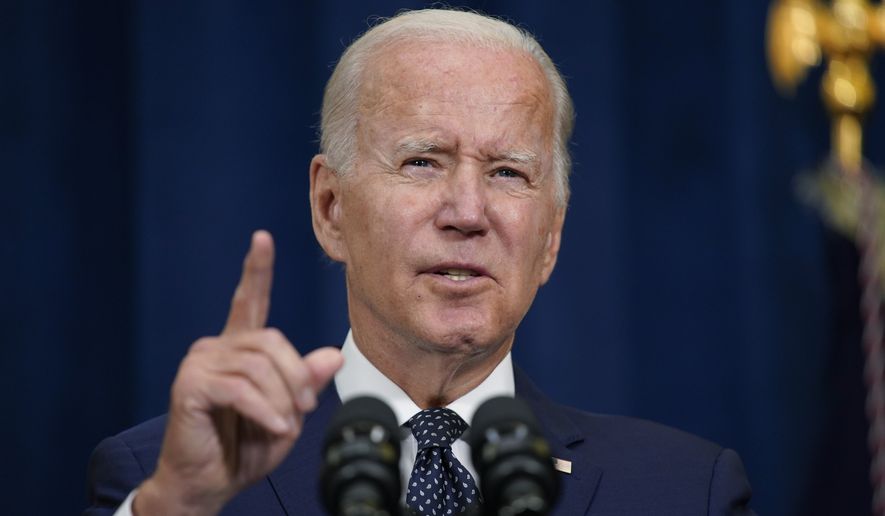OPINION:
President Biden is in deep trouble within his own party. In a recent New York Times/Siena College poll, 61% of Democrats indicated they would prefer a different standard-bearer in 2024.
Mr. Biden’s predicament stems from his political opportunism and poor judgement in staffing his administration with folks that talk down to voters and have an antipathy, nay chronic distrust for business.
In 2020, Mr. Biden offered himself to Democrats as the moderate alternative to Bernie Sanders and other younger, hard-left politicians vying for his party’s nomination. Democrats — and a good number of independents — wanted former President Donald Trump replaced but couldn’t be wholly dissatisfied with a growing, low-inflation economy.
Simply, they were repulsed by Mr. Trump’s past deeds, but were almost as discomforted by socialist rantings of Sen. Bernie Sanders and his acolytes.
Having seized the nomination, Mr. Biden immediately sought to unify his party by engaging the hard left in writing his platform and ultimately by picking the likes of Energy Secretary Jennifer Granholm and National Economic Council Director Brian Deese for top spots. He gave his party constituents the government they feared — too ideological, condescending and insular.
The country faces terribly tight food and energy supplies and ripping inflation.
Each month the news is worse than his Treasury Secretary Janet Yellen and the West Wing brain thrust told us it would be several months earlier — moderation is around the corner much like Herbert Hoover’s prosperity.
Few people these days doubt climate change — droughts in the western United States and now Europe are pushing down crop production and food prices were likely headed north even before the Russian embargo on Ukrainian grain and oilseeds. But shutting down refineries and limiting oil production doesn’t convert the grid to wind, solar and perhaps nuclear any quicker — it just makes essential driving unnecessarily unaffordable.
The president’s top 68 appointees have an average of 2.4 years of real business experience. By and large, except perhaps Commerce Secretary Gina Raimondo in private equity and Interior Secretary Deb Haaland running a gambling casino, these folks have spent their lives criticizing business from perches in politics, academia, law and think tanks.
Since the pandemic, about 2 million barrels of U.S. refining capacity have come off-line or are scheduled to be shut. That’s approximately 10% of the petroleum consumed in the United States and well enough to jack gas prices.
Administration officials have suggested with profits so high the industry could pay for a new refinery in a year. That’s absurd — no business is going to invest in an activity the administration has targeted for extinction.
Industry CEOs have tried to explain all this to Ms. Granholm with no success. With too little commercial or energy sector experience and apparently even less understanding of economics, she can’t grasp that producing one-dollar glasses of lemonade makes no sense, even when lemons and sugar cost only 50 cents, if the sheriff’s about to smash your poolside stand with a fire axe for causing tooth decay.
Americans are unsettled about abortion and climate change, but the economy and inflation top voter concerns. According to the San Francisco Federal Reserve of the factors that can be pinned down, the recent increase in inflation is about 40% too much demand and 60% too little supply.
Mr. Biden persistently blames Russian President Vladimir Putin and his National Economic Council Director, Brian Deese likes to cite monopolists, but their sticky fingers are all over the $1.9 trillion American Rescue Plan that juiced household checking accounts with money that Federal Reserve magicians created out of thin air.
The supply side conditions are well known — the logistics hangover from the pandemic, the fallout from the Russian invasion of Ukraine on energy and food supplies and shortages of refining capacity here at home.
Mr. Biden gets a pass on shipping log jams, but Americans expect him to do something about the Russians instead of imposing sanctions that likely hurt Iowans more than Muscovites. And to stop villainizing oil executives for reacting rationally to maddening calls to shut them down.
The good news for Mr. Biden is that Democrats like him better than the visible alternatives. In head-to-head polls, he beats Vice President Kamala Harris, California Gov. Gavin Newsom and Mr. Sanders.
And the plurality of all voters prefer him to Mr. Trump.
Wrapping it all together, they want Mr. Biden to be less “woke,” self-justified and more pragmatic. The good news for Democrats is that they can still win in the midterms.
The House and Senate are likely to flip, but generic House polls and state level polls for the Senate remain close.
To save his Democratic colleagues, Mr. Biden must tackle issues like inflation with more reasonable solutions — like guaranteeing oil companies a friendly hand to rebuild refining — and taking some risks — like organizing convoys in the Black Sea to get Ukrainian grain to market.
• Peter Morici is an economist, emeritus business professor at the University of Maryland, and national columnist.




Please read our comment policy before commenting.